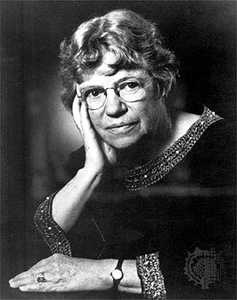Mead, Margaret
American anthropologist
born December 16, 1901, Philadelphia, Pa., U.S.
died November 15, 1978, New York, N.Y.
 American anthropologist whose great fame owed as much to the force of her personality and her outspokenness as it did to the quality of her scientific work.
American anthropologist whose great fame owed as much to the force of her personality and her outspokenness as it did to the quality of her scientific work. Mead entered DePauw University in 1919 and transferred to Barnard College a year later. She graduated from Barnard in 1923 and entered the graduate school of Columbia University, where she studied with and was greatly influenced by anthropologists Franz Boas (Boas, Franz) and Ruth Benedict (Benedict, Ruth) (a lifelong friend). Mead received an M.A. in 1924 and a Ph.D. in 1929. In 1925, during the first of her many field trips to the South Seas, she gathered material for the first of her 23 books, Coming of Age in Samoa (1928; new ed., 1968), a perennial best-seller and a characteristic example of her reliance on observation rather than statistics for data. The book clearly indicates her belief in cultural determinism, a position that caused some later 20th-century anthropologists to question both the accuracy of her observations and the soundness of her conclusions.
Mead entered DePauw University in 1919 and transferred to Barnard College a year later. She graduated from Barnard in 1923 and entered the graduate school of Columbia University, where she studied with and was greatly influenced by anthropologists Franz Boas (Boas, Franz) and Ruth Benedict (Benedict, Ruth) (a lifelong friend). Mead received an M.A. in 1924 and a Ph.D. in 1929. In 1925, during the first of her many field trips to the South Seas, she gathered material for the first of her 23 books, Coming of Age in Samoa (1928; new ed., 1968), a perennial best-seller and a characteristic example of her reliance on observation rather than statistics for data. The book clearly indicates her belief in cultural determinism, a position that caused some later 20th-century anthropologists to question both the accuracy of her observations and the soundness of her conclusions.Her other works include Growing Up in New Guinea (1930; new ed., 1975), Sex and Temperament in Three Primitive Societies (1935; reprinted, 1968), Balinese Character: A Photographic Analysis (1942, with Gregory Bateson (Bateson, Gregory), to whom she was married in 1936–51), Continuities in Cultural Evolution (1964), and A Rap on Race (1971, with James Baldwin).
During her many years with the American Museum of Natural History in New York City, she successively served as assistant curator (1926–42), associate curator (1942–64), curator of ethnology (1964–69), and curator emeritus (1969–78). Her contributions to science received special recognition when, at the age of 72, she was elected to the presidency of the American Association for the Advancement of Science. In 1979 she was posthumously awarded the Presidential Medal of Freedom, the United States's highest civilian honour.
As an anthropologist, Mead was best known for her studies of the nonliterate peoples of Oceania, especially with regard to various aspects of psychology and culture, the cultural conditioning of sexual behaviour, natural character, and culture change. As a celebrity, she was most notable for her forays into such far-ranging topics as women's rights, childrearing, sexual morality, nuclear proliferation, race relations, drug abuse, population control, environmental pollution, and world hunger.
Some of her other works are Male and Female: A Study of the Sexes in a Changing World (1949; new ed., 1975), Anthropology: A Human Science (1964), Culture and Commitment (1970), Ruth Benedict (1974), a biography of that anthropologist, and an autobiography of her own early years, Blackberry Winter (1972). Letters from the Field (1977) is a selection of Mead's correspondence written during the Samoa expedition.
Additional Reading
Mead's life and work are described in Robert Cassidy, Margaret Mead: A Voice for the Century (1982); Jane Howard, Margaret Mead, a Life (1984, reissued 1990); and Mary Catherine Bateson, With a Daughter's Eye: A Memoir of Margaret Mead and Gregory Bateson (1984, reissued 1994), written by her daughter. Lowell D. Holmes, Quest for the Real Samoa: The Mead/Freeman Controversy & Beyond (1987), examines the divergent results of Mead's and Freeman's studies.
- Yorck von Wartenburg, Johann, Graf
- Yordan Yovkov
- Yorimitsu
- York
- York, Alvin Cullum
- York and Albany, Frederick Augustus, duke of
- York, Cape
- York, Edmund of Langley, 1st duke of
- York, Edward of Norwich, 2nd duke of
- Yorke Peninsula
- York Factory
- York, Henry Stuart, cardinal duke of
- York, house of
- York plays
- York, Richard, 3rd duke of
- Yorkshire
- Yorkshire Post
- Yorkshire terrier
- Yorktown
- Yorktown, Siege of
- Yoro
- Yoruba
- Yoruba language
- Yoruba states
- Yosano Akiko